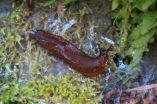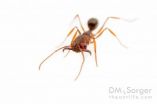(Press-News.org) The species diversity in soil fauna has been studied in temperate regions for more than 50 years, but with scarcely any mention of thrips. This lack of reference to thrips raises the question whether or not litter-dwelling thrips are distributed only in tropical and sub-tropical regions.
To answer this question a total 150 leaf litter samples were collected from 6 natural reserves located in three climatic regions, temperate, subtropical and tropical, along a 4100 km latitudinal gradient in East China. The survey was done over a four-year period by Dr Jun Wang, who is a thrips specialist and an assistant professor at the College of Plant Science, Jilin University, China. His results have been published in the open access journal ZooKeys
'Thrips constitute over 3.0% of total litter–dwelling macroinvertebrate individuals in 4 natural reserves from subtropical and tropical zone', said Dr Wang. 'In contrast, it constitute only 0.3% in the warm temperate natural reserves, and no thrips is collected in a mid temperate reserve. '
Dr Wang said that the order on the average species numbers per plot of litter thrips was tropic followed by subtropics followed by temperate. Mean density of litter thrips per plots in the tropics and subtropics was significantly higher than that in the temperate region.
Dr. Laurence Mound, CSIRO Entomology, Australia commented that this manuscript is the the first serious attempt to look at the diversity of thrips in leaf-litter, based on a good sampling strategy, and investigating the variation with latitude.
INFORMATION:
Original source
Wang J, Tong X, Wu D (2014) The effect of latitudinal gradient on the species diversity of Chinese litter-dwelling thrips. ZooKeys 417: 9. doi: 10.3897/zookeys.417.7895
Litter-dwelling thrips live mainly in tropical and subtropical regions
2014-06-18
ELSE PRESS RELEASES FROM THIS DATE:
Kids whose time is less structured are better able to meet their own goals
2014-06-18
Children who spend more time in less structured activities—from playing outside to reading books to visiting the zoo—are better able to set their own goals and take actions to meet those goals without prodding from adults, according to a new study by the University of Colorado Boulder.
The study, published online in the journal Frontiers in Psychology, also found that children who participate in more structured activities—including soccer practice, piano lessons and homework—had poorer "self-directed executive function," a measure of the ability to set and reach goals ...
Dismisses link between suicidal behaviour and ADHD drugs
2014-06-18
A new register-based study from Karolinska Institutet in Sweden shows that drug therapy for ADHD does not entail an increased risk of suicide attempts or suicide, as was previously feared. The results are published in the British Medical Journal (BMJ).
"Our work in several ways shows that most likely there is no link between treatment with ADHD drugs and an increased risk of suicide attempts or suicide. The results rather indicate that ADHD drugs may have a protective effect," says Henrik Larsson, researcher at the Department of Medical Epidemiology and Biostatistics, ...
New horned dinosaur reveals unique wing-shaped headgear
2014-06-18
Cleveland, Ohio - Scientists have named a new species of horned dinosaur (ceratopsian) based on fossils collected from Montana in the United States and Alberta, Canada. Mercuriceratops (mer-cure-E-sare-ah-tops) gemini was approximately 6 meters (20 feet) long and weighed more than 2 tons. It lived about 77 million years ago during the Late Cretaceous Period. Research describing the new species is published online in the journal Naturwissenschaften.
Mercuriceratops (Mercuri + ceratops) means "Mercury horned-face," referring to the wing-like ornamentation on its head ...
Spanish slug -- Busting an invasion myth
2014-06-18
Frankfurt am Main, Germany, June 18th 2014. Spanish slugs (Arion lusitanicus) are one of the most common slug species in Central Europe. The animals sometimes nicknamed "killer slugs" are known to do their fair share of damage in fields and gardens. The slug was thought to have originated in Southern Europe. However researchers of the German Biodiversity and Climate Centre and the Goethe University now found out, that the prime example of an invasive species is originally from Central Europe and thus no "immigrant" after all. Control measures, such as the EU regulation ...
New study is first to identify, clarify MERS-related abnormality distribution on CT
2014-06-18
Leesburg, VA, June 18, 2014—Researchers in Saudi Arabia have identified key defining characteristics of Middle East Respiratory Syndrome (MERS) in CT imaging of patients confirmed as having the disease.
The study found that the most common CT finding in hospitalized patients with MERS infection is suggestive of an organizing pneumonia pattern.
"A few studies have described variable degrees of lung opacities in patients with MERS, but did not clearly address their exact distribution," said Amr M. Ajlan, the corresponding author of the study. "Because we evaluated the ...
Study shows cost-effectiveness of smoking cessation counseling during hospitalization
2014-06-18
OTTAWA, June 18, 2014 – In a recent study published in Tobacco Control, researchers at the University of Ottawa Heart Institute have demonstrated the cost-effectiveness of the Ottawa Model for Smoking Cessation (OMSC), an intervention that includes in-hospital counseling, pharmacotherapy and post-hospital follow-up, compared to usual care among smokers hospitalized with acute myocardial infarction, unstable angina, heart failure, and chronic obstructive pulmonary disease.
The study examined patients hospitalized in Ontario, a province with a population of approximately ...
Animals conceal sickness symptoms in certain social situations
2014-06-18
The review's sole author, Dr. Patricia Lopes from the Institute of Evolutionary Biology and Environmental Studies at the University of Zurich, says that animals from a number of different species will eat and drink less, reduce their activity and sleep more when they are sick in order to conserve energy for their recovery. However, this can all change depending on the social situation.
In a paper published this week in the journal Proceedings of the Royal Society B, Lopes reviewed a range of different social situations that affected the behavior of sick animals, including ...
Childhood maltreatment associated with cerebral grey matter abnormalities
2014-06-18
An international study has analysed the association between childhood maltreatment and the volume of cerebral grey matter, responsible for processing information. The results revealed a significant deficit in various late developing regions of the brain after abuse.
According to the World Health Organisation (WHO), child maltreatment is defined as all forms of physical and/or emotional ill-treatment, sexual abuse, neglect or negligent treatment or commercial or other exploitation, resulting in actual or potential harm to the child's health, survival, development or dignity ...
Trap-jaw ants spreading in southeastern United States
2014-06-18
Trap-jaw ant species are active hunters with venomous stings and jaws powerful enough to fling themselves through the air. According to new research, they are also spreading into new territory in the southeastern United States. The research was done by scientists at North Carolina State University, the Mississippi Entomological Museum, the University of California, Davis and Archbold Biological Station.
"The fact that some of these species are spreading is interesting, in part, because these giant ants have managed to expand their territory without anyone noticing," says ...
Scientists about sequencing data: We drown in data but thirst for knowledge
2014-06-18
While more and more genomic information is becoming available at a drastically increasing pace, the knowledge we can gain about how microorganisms interact with their surrounding, infect hosts and alter their molecular programs in accordance to changing environmental conditions remains widely not deducible from genomic data alone, the researchers from University of Southern Denmark claim. This raises questions regarding the value of newly sequenced species.
The researchers have analyzed the genomes that are available from the past 20 years of sequencing bacterial DNA. ...





